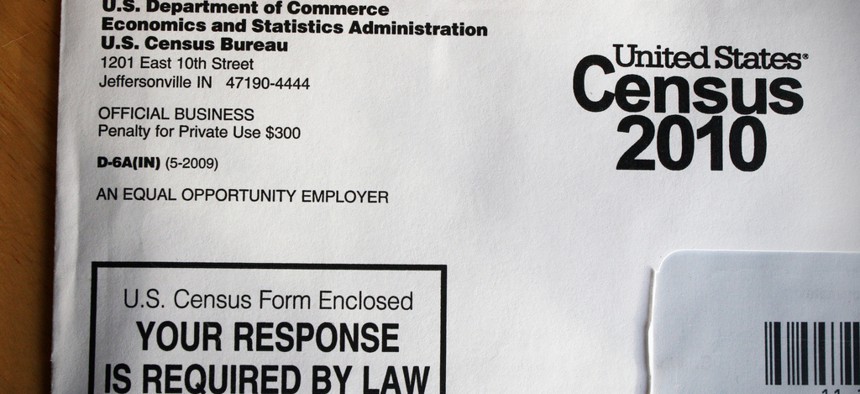
Flickr user quinnanya
Census Faces Pressure from Both Chambers of Congress and Both Political Parties
House may vote this week to make mandatory community survey voluntary.
Nine months into his job as Census director, John Thompson is experiencing his first full appropriations process while facing pressure from Congress to keep the 2020 big count on schedule and refrain from violating Americans’ privacy.
As the House gets set this week to consider the Commerce Department’s appropriations bill, Rep. Ted Poe, R-Texas, is planning to attach an amendment based on his long-standing bill to make the Census Bureau’s American Community Survey voluntary instead of mandatory.
“The ACS asks each recipient 48 personal questions about mental disabilities in the home, personal financial information, whether you have a toilet and what time you leave for and return from work each day,” Poe said last year on reintroducing a bill that cleared the House in 2012. “Under current law, those who choose not to respond to the ACS are threatened with a criminal penalty. The federal government has no right to force Americans to tell the government personal information that they are uncomfortable providing just because the federal government says so.”
Opponents such as the nonprofit coalition called the Census Project warned that eliminating participation in the survey—which guides more than $400 billion yearly in aid to state and local governments for education, transportation, health and housing—would reduce the response rate from 95 percent to 60 percent. “Making the ACS voluntary would probably leave smaller communities, especially most rural areas, without any credible data for these vital activities,” said the project’s co-directors in a Monday statement.
The appropriations bill, as marked up in committee, would provide $105 million less than the $1.2 billion requested by the Obama administration. That request might fare better in the Democratic-controlled Senate, though at least two senators have weighed in with warnings that Census is mishandling its existing budget while laying the groundwork for the 2020 census.
Sen. Tom Carper, D-Del., chairman of the Homeland Security and Governmental Affairs Committee, joined with ranking member Sen. Tom Coburn, R-Okla., in a May 15 letter saying they “are very concerned about the instability of the 2020 Census schedule including delays in research, field tests and projects. These delays have set back key decision deadlines and ultimately postponed the decision on the final design of the 2020 Census by a full year, until September 2015. We are also concerned that the bureau has not fully integrated cost estimates into the 2020 Census,” which is key to keeping tabs on the budget, they continued. “If these problems persist, the schedule may be further delayed, adversely impacting the operational development and system testing phase of the 2020 Census and -- eventually -- the execution of the census itself.”
Carper and Coburn posed a series of questions on timelines and metrics for gauging progress, asking in particular about how the Commerce Department intends to resolve the conflict between the Census planners’ hope to allow researchers to “bring their own” mobile devices and Commerce’s rule against doing official business on personal devices.
The senators did, however, note the bureau’s progress in exploiting new technologies and expressed hope that the next decennial count will be successful “at or below the nearly $13 billion cost.”
In a May 19 response to the senators, a census statement thanked them for their “input and collaboration into our planning” and promised answers to their questions.
Thompson, meanwhile, used a May 13 blogpost to highlight the bureau’s new website design implemented in the site’s 20th year. “While the first Census.gov launched only five years after the World Wide Web began, it is not the only example of how the Census Bureau has always been on the leading edge of technology in the government,” Thompson wrote. “From Herman Hollerith’s first tabulating machine, used for the 1890 Census, to UNIVAC 1, one of the first civilian computers, to advancements in how we deliver our statistics to you today, we are using the latest technological advancements to better measure America.”
In a March 14 blog, Thompson expressed satisfaction with the $944 million budget Congress provided for fiscal 2014, saying it “aligns with” the request for fiscal 2015 in nailing down the final spending push in designing the 2020 count. “ Our fiscal 2015 request supports critical, targeted investments in research, testing and IT infrastructure,” he wrote. “Millions in investment in research, testing and enterprise systems will save billions in the 2020 Census and result in smart system solutions across the enterprise. The budget request also supports continued investments in the comprehensive and relevant data that are necessary for informed decision-making by the private sector, public sector and individuals. These investments are balanced with efficiencies and attention to reduced burden for those who respond to our surveys.”
(Image via Flickr user quinnanya)







